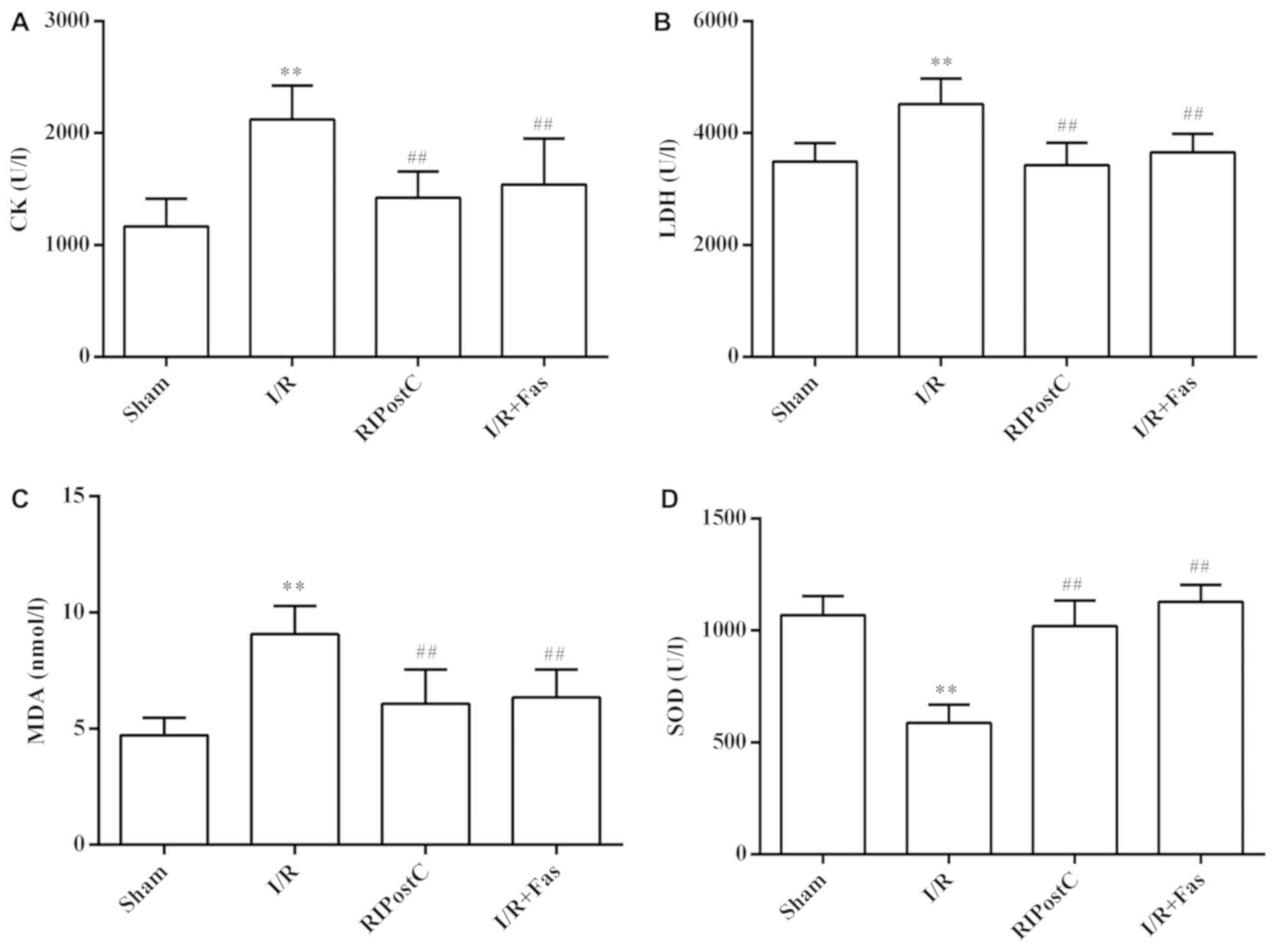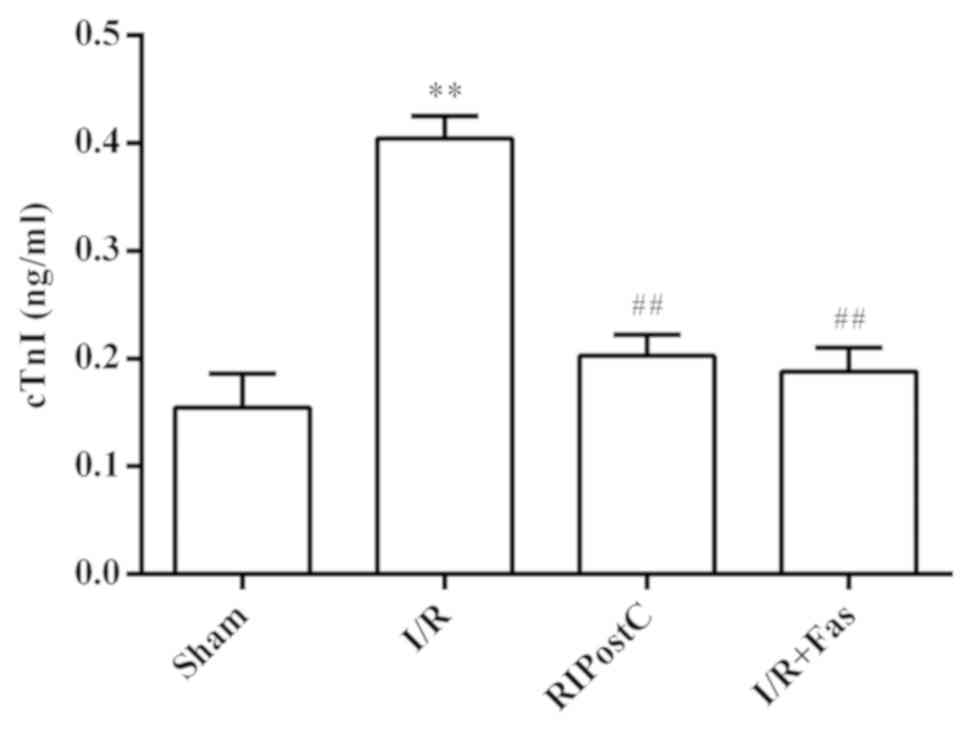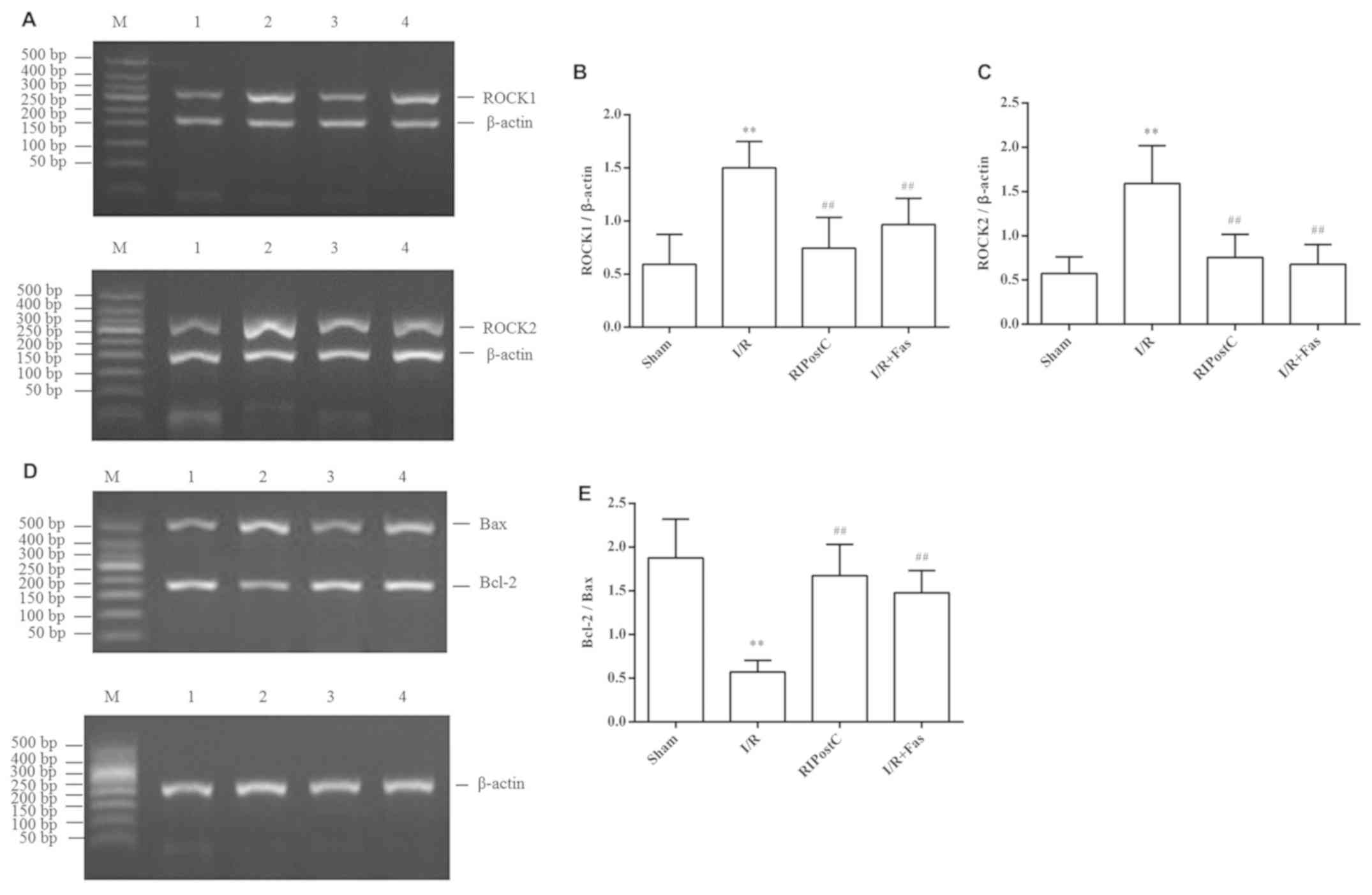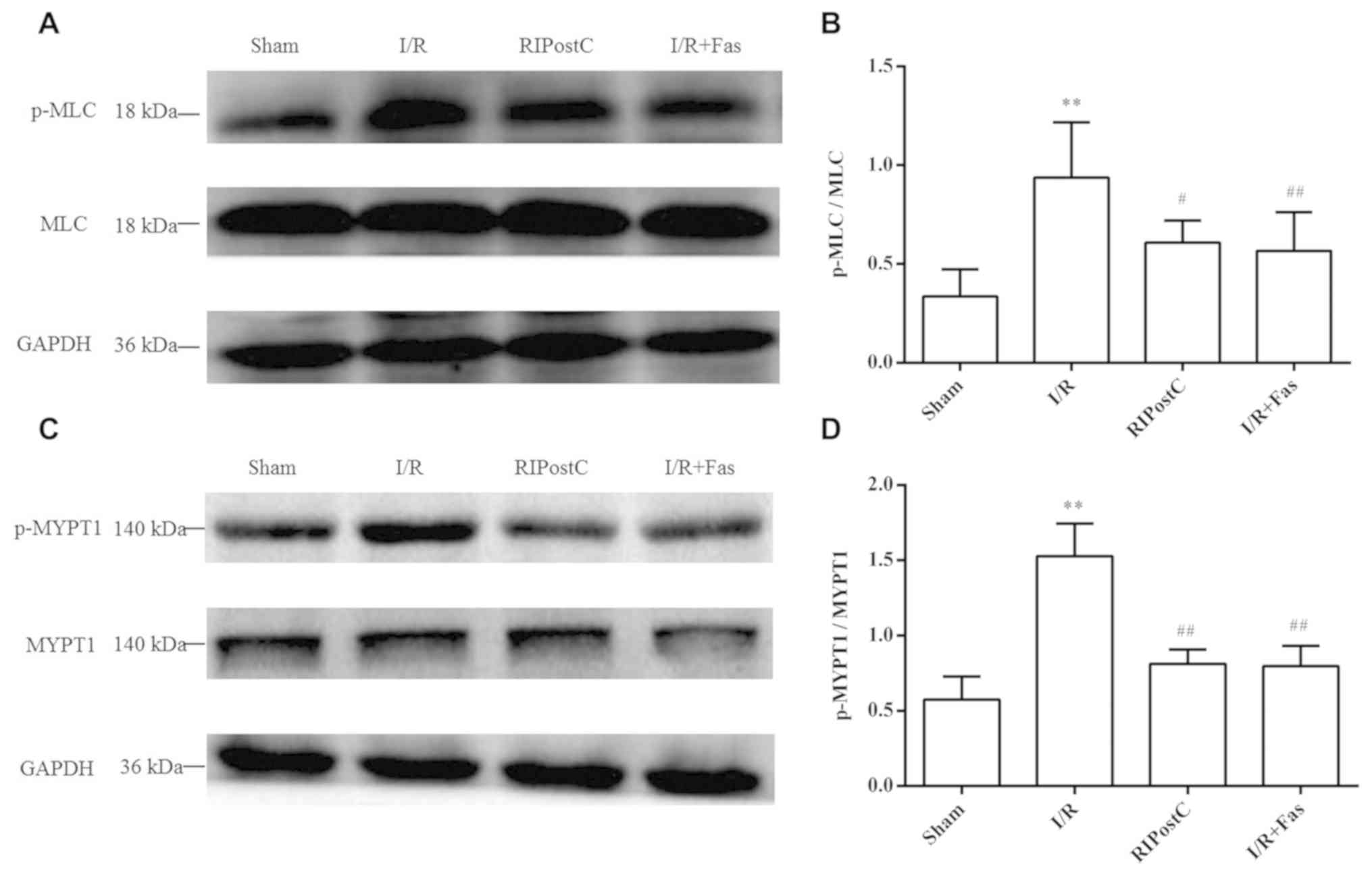|
1
|
Anderson L, Oldridge N, Thompson DR,
Zwisler AD, Rees K, Martin N and Taylor RS: Exercise-based cardiac
rehabilitation for coronary heart disease: Cochrane systematic
review and meta-analysis. J Am Coll Cardiol. 67:1–12. 2016.
View Article : Google Scholar : PubMed/NCBI
|
|
2
|
Hu G, Yang P, Zeng Y, Zhang S and Song J:
Danggui Buxue decoction promotes angiogenesis by up-regulation of
VEGFR1/2 expressions and down-regulation of sVEGFR1/2 expression in
myocardial infarction rat. J Chin Med Assoc. 81:37–46. 2018.
View Article : Google Scholar : PubMed/NCBI
|
|
3
|
Jiang H, Wang H, Liu T, Yang Z, Zhang R
and Han H: Co-cultured the MSCs and cardiomyocytes can promote the
growth of cardiomyocytes. Cytotechnology. 70:793–806. 2018.
View Article : Google Scholar : PubMed/NCBI
|
|
4
|
Matsumura K, Jeremy RW, Schaper J and
Becher LC: Progression of myocardial necrosis during reperfusion of
ischemic myocardium. Circulation. 97:795–804. 1998. View Article : Google Scholar : PubMed/NCBI
|
|
5
|
Buja LM and Entman ML: Modes of myocardial
cell injury and cell death in ischemic heart disease. Circulation.
98:1355–1357. 1998. View Article : Google Scholar : PubMed/NCBI
|
|
6
|
Li X, Liu M, Sun R, Zeng Y, Chen S and
Zhang P: Protective approaches against myocardial ischemia
reperfusion injury. Exp Ther Med. 12:3823–3829. 2016. View Article : Google Scholar : PubMed/NCBI
|
|
7
|
Kerendi F, Kin H, Halkos ME, Jiang R,
Zatta AJ, Zhao ZQ, Guyton RA and Vinten-Johansen J: Remote
postconditioning. Brief renal ischemia and reperfusion applied
before coronary artery reperfusion reduces myocardial infarct size
via endogenous activation of adenosine receptors. Basic Res
Cardiol. 100:404–412. 2005. View Article : Google Scholar : PubMed/NCBI
|
|
8
|
Hausenloy DJ and Yellon DM: Ischaemic
conditioning and reperfusion injury. Nat Rev Cardiol. 13:193–209.
2016. View Article : Google Scholar : PubMed/NCBI
|
|
9
|
Huang J, Xu D, Guo Q, Ou B, Ling Q, Li J,
Yang Z and Tang W: Remote ischemic postconditioning improves
myocardial dysfunction via the risk and safe pathways in a rat
model of severe hemorrhagic shock. Shock. 49:460–465. 2018.
View Article : Google Scholar : PubMed/NCBI
|
|
10
|
Li CM, Zhang XH, Ma XJ and Luo M: Limb
ischemic postconditioning protects myocardium from
ischemia-reperfusion injury. Scand Cardiovasc J. 40:312–317. 2006.
View Article : Google Scholar : PubMed/NCBI
|
|
11
|
Andreka G, Vertesaljai M, Szantho G, Font
G, Piroth Z, Fontos G, Juhasz ED, Szekely L, Szelid Z, Turner MS,
et al: Remote ischaemic postconditioning protects the heart during
acute myocardial infarction in pigs. Heart. 93:749–752. 2007.
View Article : Google Scholar : PubMed/NCBI
|
|
12
|
Deftereos S, Giannopoulos G, Tzalamouras
V, Raisakis K, Kossyvakis C, Kaoukis A, Panagopoulou V,
Karageorgiou S, Avramides D, Toutouzas K, et al: Renoprotective
effect of remote ischemic post-Conditioning by intermittent balloon
inflations in patients undergoing percutaneous coronary
intervention. J Am Coll Cardiol. 61:1949–1955. 2013. View Article : Google Scholar : PubMed/NCBI
|
|
13
|
Dezfulian C, Garrett M and Gonzalez NR:
Clinical application of preconditioning and postconditioning to
achieve neuroprotection. Transl Stroke Res. 4:19–24. 2013.
View Article : Google Scholar : PubMed/NCBI
|
|
14
|
Hu X, Lv T, Yang SF, Zhang XH and Miao YF:
Limb remote ischemic post-conditioning reduces injury and improves
long-term behavioral recovery in rats following subarachnoid
hemorrhage: Possible involvement of the autophagic process. Mol Med
Rep. 17:21–30. 2018.PubMed/NCBI
|
|
15
|
Aimo A, Borrelli C, Giannoni A,
Pastormerlo LE, Barison A, Mirizzi G, Emdin M and Passino C:
Cardioprotection by remote ischemic conditioning: Mechanisms and
clinical evidences. World J Cardiol. 7:621–632. 2015. View Article : Google Scholar : PubMed/NCBI
|
|
16
|
Liao JK, Seto M and Noma K: Rho kinase
(ROCK) inhibitors. J Cardiovasc Pharmacol. 50:17–24. 2007.
View Article : Google Scholar : PubMed/NCBI
|
|
17
|
Satoh K, Fukumoto Y and Shimokawa H:
Rho-kinase: Important new therapeutic target in cardiovascular
diseases. Am J Physiol Heart Circ Physiol. 301:H287–H296. 2011.
View Article : Google Scholar : PubMed/NCBI
|
|
18
|
Shimokawa H, Sunamura S and Satoh K:
RhoA/Rho-kinase in the cardiovascular system. Circ Res.
118:352–366. 2016. View Article : Google Scholar : PubMed/NCBI
|
|
19
|
Ye HW, Fang TT, Gu XY, Wang Y, Zhu GY, Yu
Y and Gao Q: Role of autophagy in fasudil-induced Rho kinase
inhibition for protection against myocardial ischemia-reperfusion
injury in rats. Nan Fang Yi Ke Da Xue Xue Bao. 36:1706–1711.
2016.(In Chinese). PubMed/NCBI
|
|
20
|
Zhang J, Liu XB, Cheng C, Xu DL, Lu QH and
Ji XP: Rho-kinase inhibition is involved in the activation of
PI3-kinase/Akt during ischemic-preconditioning-ind-uced
cardiomyocyte apoptosis. Int J Clin Exp Med. 7:4107–4114.
2014.PubMed/NCBI
|
|
21
|
Zhang WP, Zong QF, Gao Q, Yu Y, Gu XY,
Wang Y, Li ZH and Ge M: Effects of endomorphin-1 postconditioning
on myocardial ischemia/reperfusion injury and myocardial cell
apoptosis in a rat model. Mol Med Rep. 14:3992–3998. 2016.
View Article : Google Scholar : PubMed/NCBI
|
|
22
|
Cheng XY, Gu XY, Gao Q, Zong QF, Li XH and
Zhang Y: Effects of dexmedetomidine postconditioning on myocardial
ischemia and the role of the PI3K/Akt-dependent signaling pathway
in reperfusion injury. Mol Med Rep. 14:797–803. 2016. View Article : Google Scholar : PubMed/NCBI
|
|
23
|
Yang J, Fan Z, Yang J, Ding J, Yang C and
Chen L: microRNA-22 attenuates myocardial ischemia-reperfusion
injury via an anti-inflammatory mechanism in rats. Exp Ther Med.
12:3249–3255. 2016. View Article : Google Scholar : PubMed/NCBI
|
|
24
|
Yu Y, Jia XJ, Zong QF, Zhang GJ, Ye HW, Hu
J, Gao Q and Guan SD: Remote ischemic postconditioning protects the
heart by upregulating ALDH2 expression levels through the PI3K/Akt
signaling pathway. Mol Med Rep. 10:536–542. 2014. View Article : Google Scholar : PubMed/NCBI
|
|
25
|
Li Y, Zhu W, Tao J, Xin P, Liu M, Li J and
Wei M: Fasudil protects the heart against ischemia-reperfusion
injury by attenuating endoplasmic reticulum stress and modulating
SERCA activity: The differential role for PI3K/Akt and JAK2/STAT3
signaling pathways. PLos One. 7:e481152012. View Article : Google Scholar : PubMed/NCBI
|
|
26
|
Schmidt MR, Sloth AD, Johnsen J and Bøtker
HE: Remote ischemic conditioning: The cardiologist's perspective. J
Cardiovasc Med (Hagerstown). 13:667–674. 2012. View Article : Google Scholar : PubMed/NCBI
|
|
27
|
Liem DA, Verdouw PD and Duncker DJ:
Transient limb ischemia induces remote ischemic preconditioning in
vivo. Circulation. 107:e218–e219. 2003. View Article : Google Scholar : PubMed/NCBI
|
|
28
|
Roubille F, Franck-Miclo A, Covinhes A,
Lafont C, Cransac F, Combes S, Vincent A, Fontanaud P,
Sportouch-Dukhan C, Redt-Clouet C, et al: Delayed postconditioning
in the mouse heart in vivo. Circulation. 124:1330–1336. 2011.
View Article : Google Scholar : PubMed/NCBI
|
|
29
|
Xin P, Zhu W, Li J, Ma S, Wang L, Liu M,
Li J, Wei M and Redington AN: Combined local ischemic
postconditioning and remote perconditioning recapitulate
cardioprotective effects of local ischemic preconditioning. Am J
Physiol Heart Circ Physiol. 298:H1819–H1831. 2010. View Article : Google Scholar : PubMed/NCBI
|
|
30
|
Kalogeris T, Bao Y and Korthuis RJ:
Mitochondrial reactive oxygen species: A double edged sword in
ischemia/reperfusion vs preconditioning. Redox Boil. 2:702–714.
2014. View Article : Google Scholar
|
|
31
|
Mythili S and Malathi N: Diagnostic
markers of acute myocardial infarction. Biomed Rep. 3:743–748.
2015. View Article : Google Scholar : PubMed/NCBI
|
|
32
|
O'Brien PJ: Cardiac troponin is the most
effective translational safety biomarker for myocardial injury in
cardiotoxicity. Toxicology. 245:206–218. 2008. View Article : Google Scholar : PubMed/NCBI
|
|
33
|
Gao YH, Chen L, Ma YL and He QY: Chronic
intermittent hypoxia aggravates cardiomyocyte apoptosis in rat
ovariectomized model. Chin Med J (Engl). 125:3087–3092.
2012.PubMed/NCBI
|
|
34
|
Bian H, Zhou Y, Yu B, Shang D, Liu F, Li B
and Qi J: Rho-kinase signaling pathway promotes the expression of
PARP to accelerate cardiomyocyte apoptosis in ischemia/reperfusion.
Mol Med Rep. 16:2002–2008. 2017. View Article : Google Scholar : PubMed/NCBI
|
|
35
|
Cheng Y, Tan J, Li H, Kong X, Liu Y, Guo
R, Li G, Yang B and Pei M: Cardioprotective effects of total
flavonoids from Jinhe Yangxin prescription by activating the
PI3K/Akt signaling pathway in myocardial ischemia injury. Biomed
Pharmacother. 98:308–317. 2018. View Article : Google Scholar : PubMed/NCBI
|
|
36
|
Jiao Y, Fan YF, Wang YL, Zhang JY, Chen S
and Chen ZW: Protective effect and mechanism of total flavones from
rhododendron simsii planch flower on cultured rat cardiomyocytes
with anoxia and reoxygenation. Evid Based Complement Alternat Med.
2015:8635312015. View Article : Google Scholar : PubMed/NCBI
|
|
37
|
Shi J and Wei L: Rho kinase in the
regulation of cell death and survival. Arch Immunol Ther Exp
(Warsz). 55:61–75. 2007. View Article : Google Scholar : PubMed/NCBI
|
|
38
|
Amano M, Ito M, Kimura K, Fukata Y,
Chihara K, Nakano T, Matsuura Y and Kaibuchi K: Phosphorylation and
activation of myosin by Rho-associated kinase (Rho-kinase). J Biol
Chem. 271:20246–20249. 1996. View Article : Google Scholar : PubMed/NCBI
|
|
39
|
Wang Y, Wang X, Liu W and Zhang L: Role of
the Rho/ROCK signaling pathway in the protective effects of fasudil
against acute lung injury in septic rats. Mol Med Rep.
18:4486–4498. 2018.PubMed/NCBI
|



















